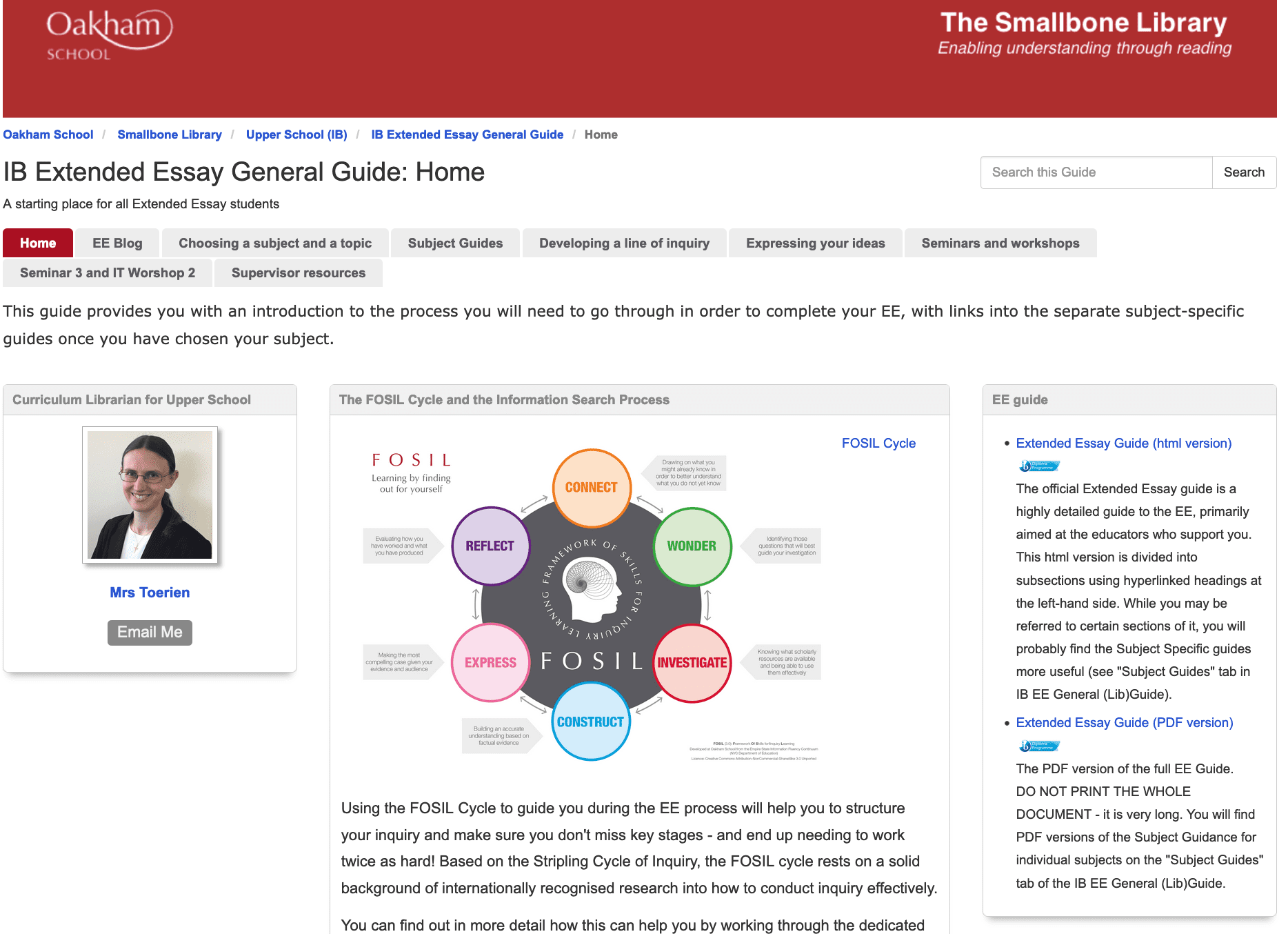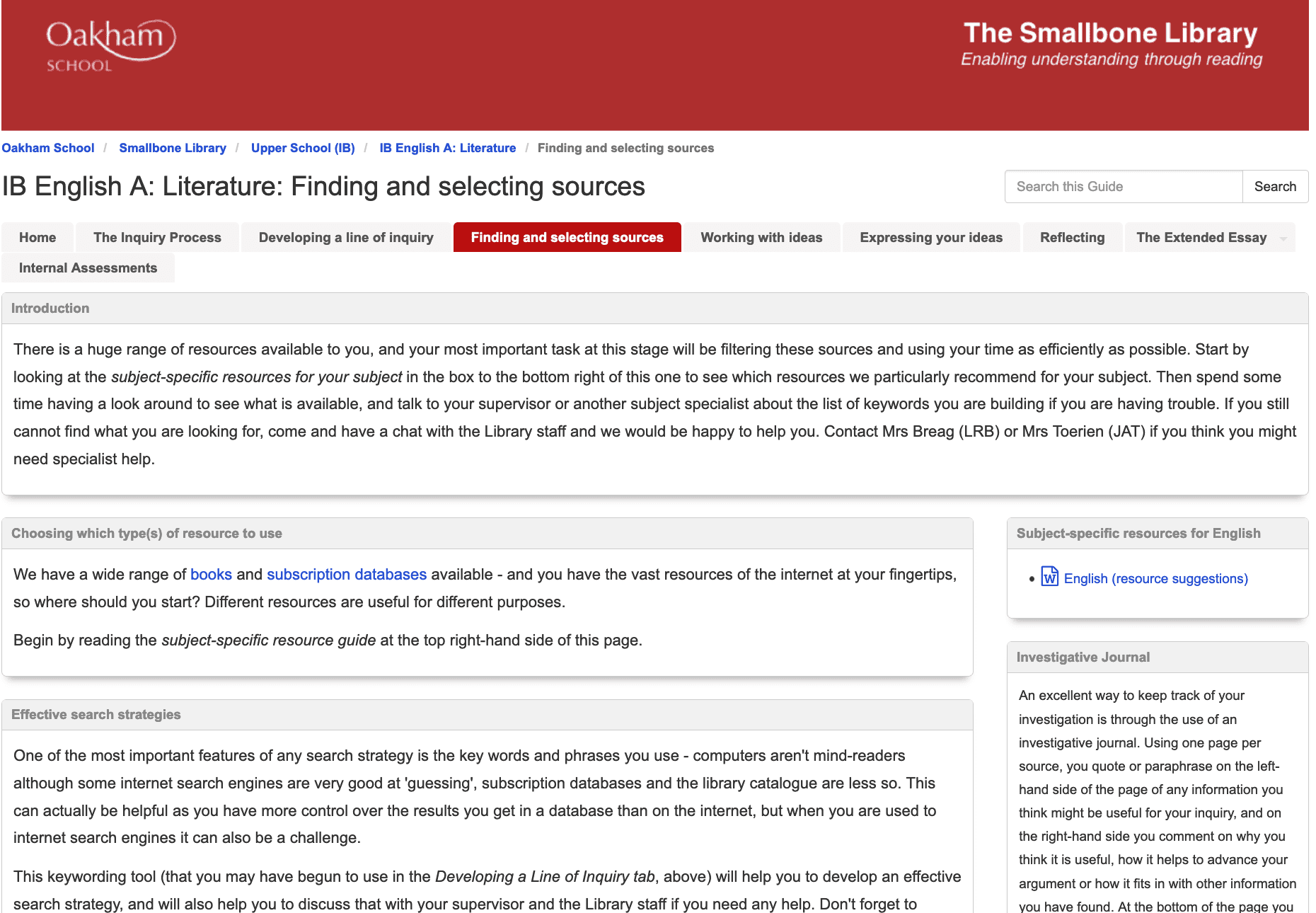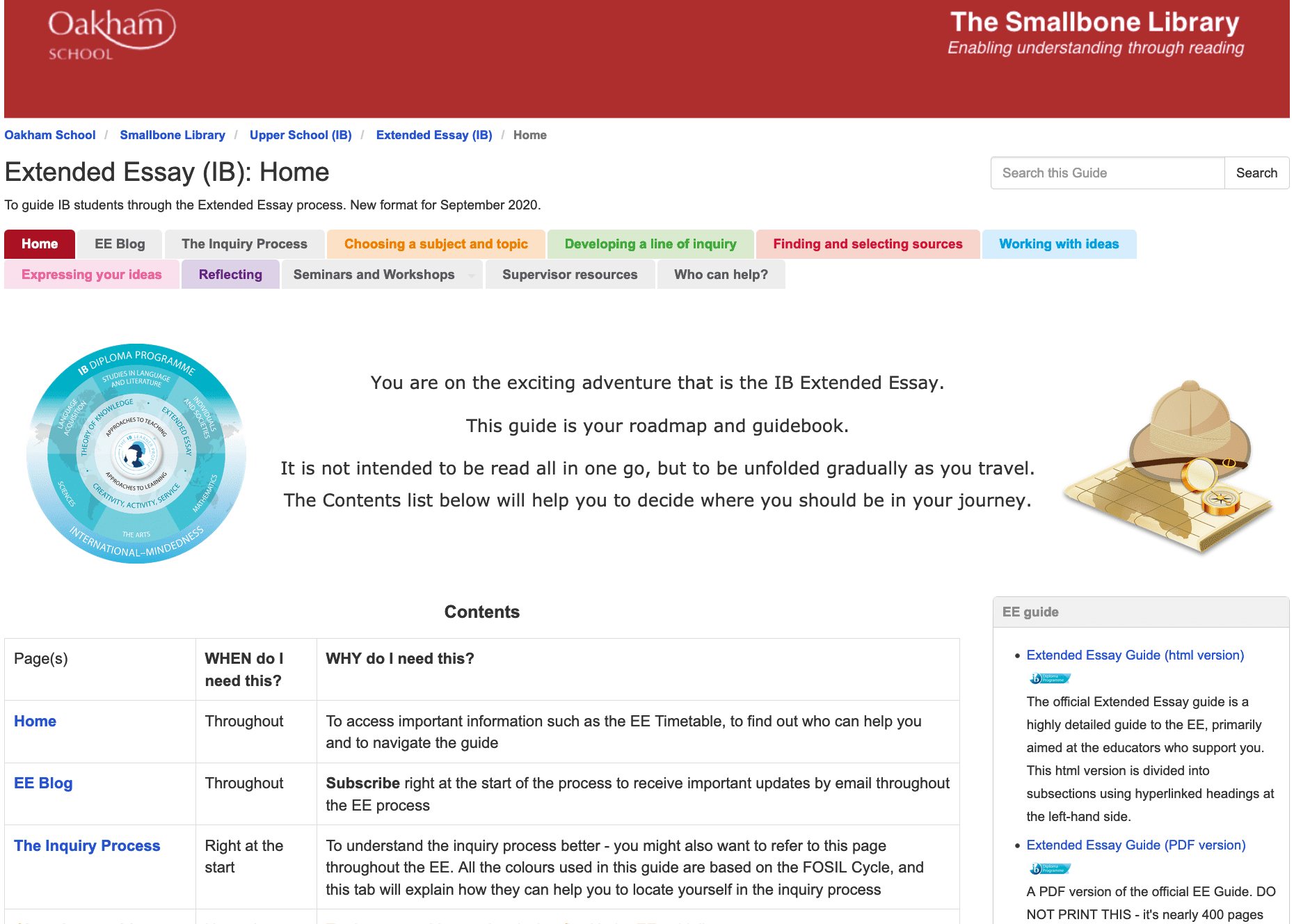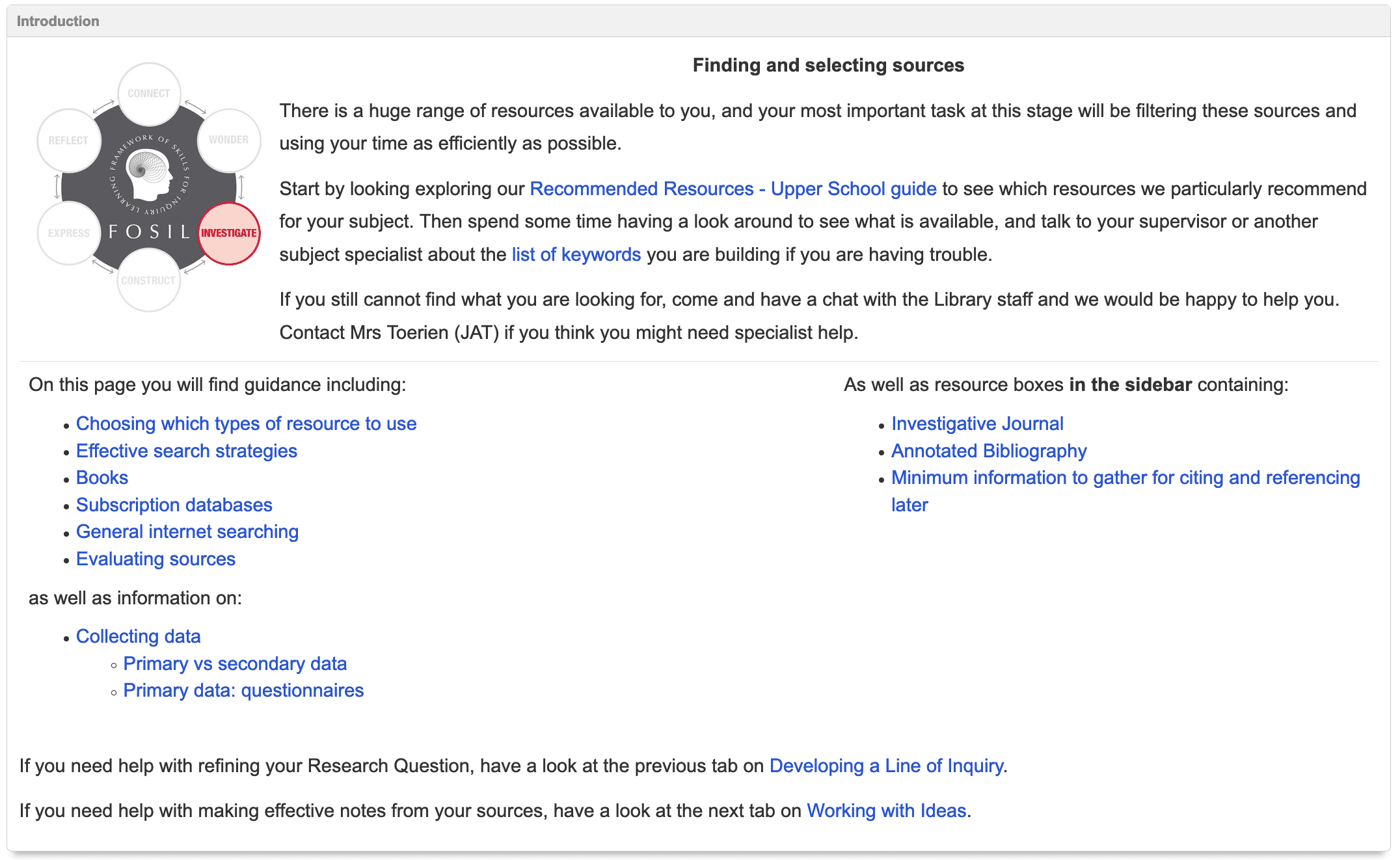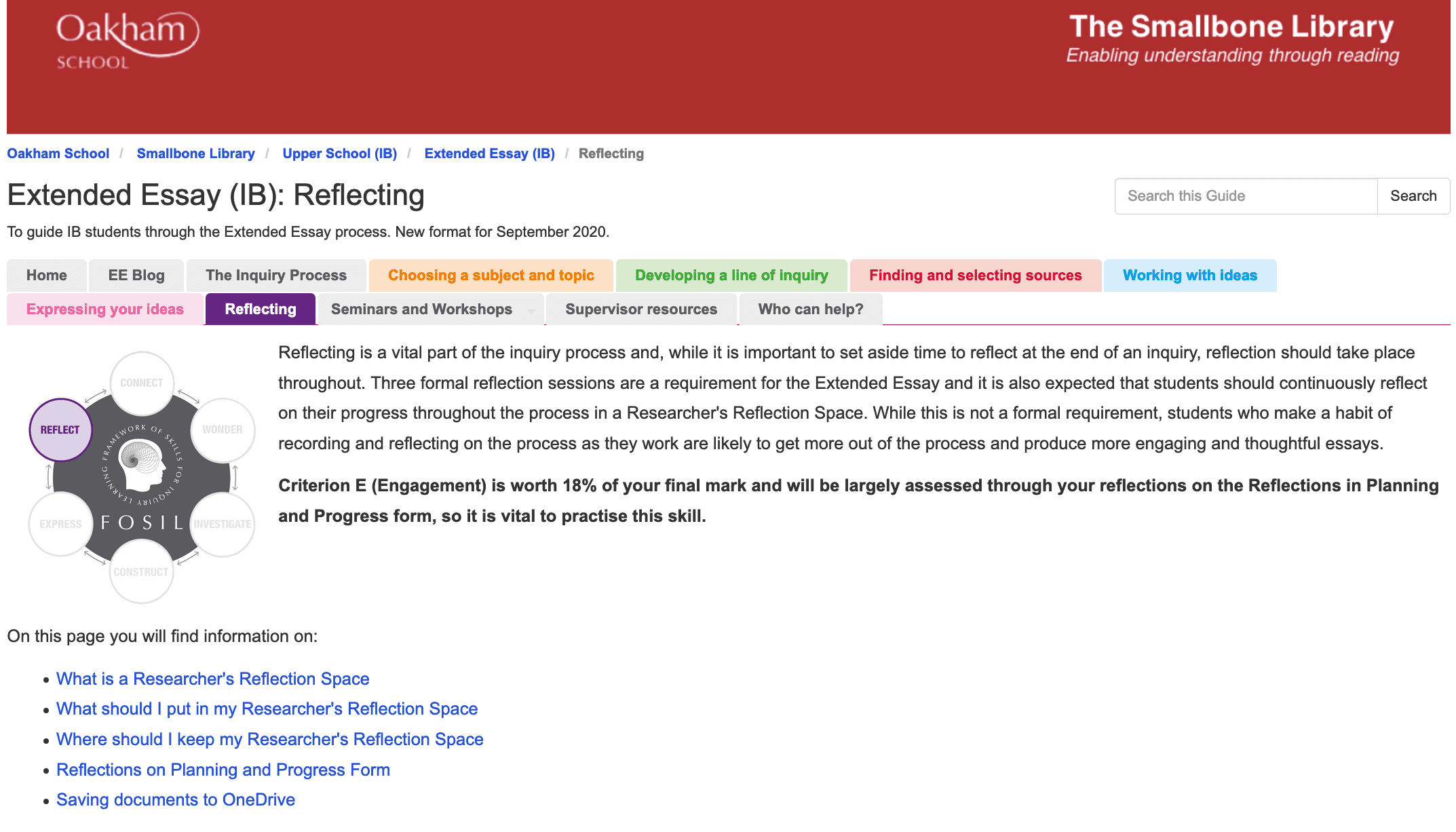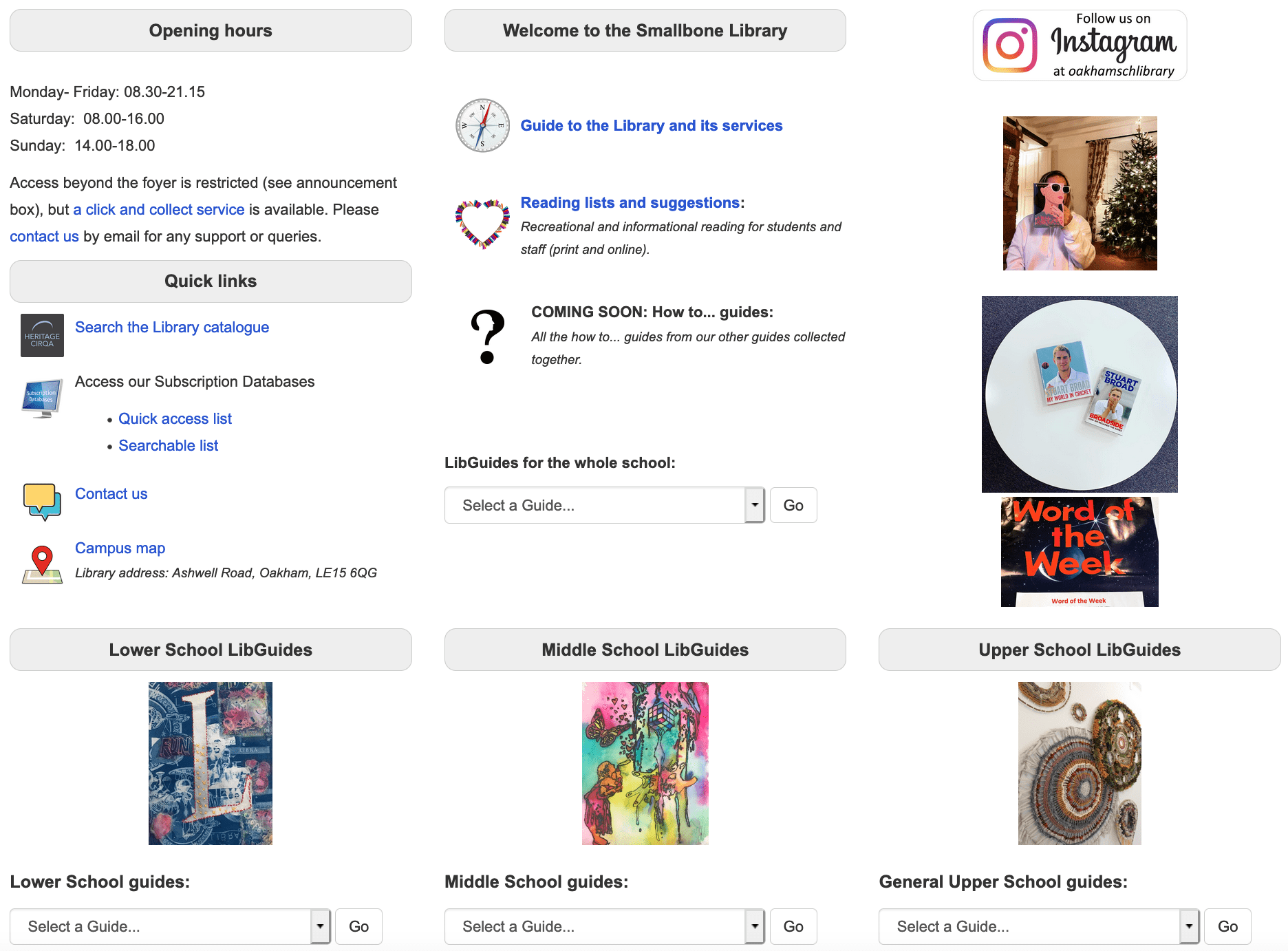FOSIL and the IB Diploma Programme Extended Essay (EE)
Home › Forums › Inquiry and resource design › FOSIL and the IB Diploma Programme Extended Essay (EE)
Tagged: Extended Essay, IB DP
- This topic has 21 replies, 7 voices, and was last updated 7 months, 1 week ago by
 Jenny Toerien.
Jenny Toerien.
-
AuthorPosts
-
6th May 2019 at 3:26 pm #1243
Our journey to FOSIL started with two very specific needs.
Firstly, how to actually prepare our students for the demands of the International Baccalaureate (IB) Diploma Programme (DP) Extended Essay (EE), a mandatory independent, self-directed piece of research, finishing with a 4,000-word paper, and specifically how to accurately cite and reference according to a recognized system, when, for the majority of them, their preparation for the Upper School was severely limited to being prepared for their GCSE examinations. This led me to what I thought was an information literacy framework, but, thankfully, turned out to be an inquiry skills framework (please see E&L Memo 0 | Developing inquiring minds: a journey from information through knowledge to understanding for more detail) and accompanying model of the inquiry process, which directly led to FOSIL.
Secondly, how to more effectively support the EE process out of a deeper understanding of the inquiry process. This was driven by a sense that our EE timetable, which in many respects was exemplary, worked against the inquiry process at certain key points, for example, the requirement to identify a research question at the start of the process rather than allowing the research question to emerge from the process. This led me to Carol Kuhlthau’s Information Search Process, which not only added an affective, cognitive and physical dimension to our understanding of the inquiry process, which allowed us to realign out EE timetable to work with the inquiry process, but also identified points of optimal intervention in support of the EE process (please see E&L Memo 0 | Developing inquiring minds: a journey from information through knowledge to understanding for more detail).
A slightly dated overview of library interventions may be found in the case study on the IB’s Approaches to teaching and learning micro-site – The extended essay, Kuhlthau’s information search process (ISP) model and library interventions at Oakham School.
Although we have traveled further along this particular path with FOSIL, we still have a way to go.
5th August 2019 at 10:23 pm #2471I would like to ask a question about what you have said relating to the inquiry process and the Extended Essay research question. I wondered whether you were suggesting that it is a requirement of the IBO that the student start the process of the EE with a research question or whether that was something that your school had required. I assume that it is the latter. For me as a supervisor, it has always been so exciting to see my students start with an idea and slowly develop their question through trial, error and inspiration.
6th August 2019 at 9:14 am #2472Hello, Susan, and welcome. The requirement to start with the research question was internal, but I seem to recall that the previous EE specification contributed to this expectation, if it didn’t actually create it. Even though we have realigned our EE timetable to more accurately reflect our growing understanding of the inquiry process (see E&L Memo 0 | Developing inquiring minds: a journey from information through knowledge to understanding), we still have some way to go in helping all supervisors to fully understand and effectively support this process, which is, as you suggest, the difference between finding information to answer a question (that may not even be your own) to discovering for yourself a question is that worth the effort of answering. I’d certainly be curious to hear more about your supervisor training and/or support.
6th August 2019 at 10:16 am #2473I’ve never been given training as a supervisor. Instead I came to the role of a supervisor in a round about way. I am the teacher-librarian for the secondary library at my school. When I started in the role 10 years ago, I developed a relationship with the head of I & S, Keely Rogers, and began working with her diploma students on research skills. Soon, I was asked by Ms. Rogers, as EE co-ordinator to assist her with the Extended Essay, which led me to taking over as the co-ordinator two years later. Three years ago we had an excess of students who wished to do a history EE and I was asked to supervise one student. I have to say that my academic background is in modern languages in which I received an MA in French. Thus, not only had I never supervised before but it was also not my subject area. I received a lot of support from Ms. Rogers relating to the writing of a history EE but as far as being a supervisor, I had to call on my library training and my understanding of the importance of the inquiry process along with what I read in IB documents and other literature. In 2015, I stumbled across Carol Kuhlthau and guided inquiry at the American Association of School Librarians conference in Columbus, Ohio, while taking a workshop on guided inquiry and the humanities. Though my school has been an IB World school for over 15 years, only the PYP program is truly inquiry based and though guided inquiry was somewhat of a revelation, it was more a eureka moment when I realised that this was what I had been trying to do all along.
As the EE co-ordinator till two years ago, I developed a handbook for supervisors and had several sessions with the newcomers but unfortunately we seem to have little time in our schedule for training. I did show supervisors the videos on supervisor-student meetings when the new guide came into effect but little more has taken place. This is a regret.
29th December 2020 at 7:55 am #33368I’m surprised to discover that I have never written about our Extended Essay support on this forum, as it is really where our journey with FOSIL began, as Darryl mentions above. Darryl has often written about this elsewhere, and I recently wrote a post for the Ideas Roadshow blog on The Role of The Librarian in the IB DP, which explains our support in more detail if anyone is interested, so I am not intending to go into the background here. This forum gives me the opportunity to reflect on the design process for our support and how it is evolving over time.
For those unfamiliar with it, the Extended Essay is (as Darryl says above) an independent, self-directed piece of research, finishing with a 4,000-word paper , which is a compulsory element of the International Baccalaureate Diploma Program. We are in an interesting situation as a school because we offer both the IB DP and A-levels (and two BTECs) as alternative pathways through our Upper School (and are a three year IB MYP candidate school offering GCSEs in Years 10 and 11). This mixed economy allows for a great deal of transfer of ideas between ‘codes’ – a number of our EE resources have been very helpful in supporting the EPQ, for example (see the forum topic FOSIL and the Extended Project Qualification (EPQ) and the resource Supporting EPQs at Oakham) and we are looking at developing this provision further.
I am going to outline below the basic structure of the support the Library provides for EE students, which runs alongside the compulsory support provided by the supervisor, a subject teacher who has expert knowledge of the broad subject area and is expected to spend 4-6 hours over the course of the essay (which takes about 10 months on our timetable) supporting the student individually. This includes 3 formal reflection sessions (after which the student must write assessed reflections) and feedback on the first draft. The supervisor may only offer comments on one draft of the essay.
29th December 2020 at 8:09 am #33371Basic support outline
This is an outline of what the Library, in conjunction with, Chris Foster, our Head of Student Research (a hugely important collaboration which I will elaborate on in a future post) offers, which has been developed over many years:
- 3 seminars for the whole cohort at critical intervention points
- two near the start of the process to introduce the idea of the essay and the formal requirements, to help students to select a suitable topic and for them to learn how to investigate that topic effectively and efficiently, using all the resources at their disposal appropriately, and
- one just before the Writing Days to explain the formal presentation requirements and remind them about citing and referencing
- 2 IT workshops
- one just before the Investigation Days to teach them how to use the citing and referencing tools embedded in Word and the Investigative Journal, and
- one just before the Writing Days to show them how to set up their document using features like contents lists, headers and footers and page breaks, and how to transfer their citations from their Investigative Journal to their essay.
- 2 off-timetable periods
- three Investigation Days in February to jump-start the reading process and give students time to immerse themselves in their topics, and
- two Writing Days in May to give them concentrated time to write up their findings before submitting their first draft to their supervisors. Both of these periods happen in the Library (unless they are doing a practical subject and need to be, for example, in the Science labs, Art studios or DT workshops) so they are surrounded by the resources they need and have easy access to support.
- Some sort of subject-specific resourcing support (alongside that offered by their individual subject Supervisor). This has evolved over the years from individual reference interviews when the cohort was smaller and we were less involved in inquiry across the whole school, to compulsory subject specific seminars for small groups of students doing their EEs in similar subjects, to point-of-need provision with detailed subject support available in online guides, supported by drop-in sessions during the Investigation and Writing Days and the option to meet with me individually if they need specific support.
- A range of FOSIL resources. The investigative journal, which we now use very widely, was originally developed for the EE, but there are also a number of very specific resources developed to support the process.
- We also run Supervisor INSET every year, just after supervisors have been assigned. This is both to support new supervisors in developing an understanding of the process, their role in it and the additional support the Library provides, but also to update experienced supervisors on any changes in the rules and in the support we provide and advice we give. Anyone is welcome, all supervisors are expected to attend, and HODs are encouraged to come even if not supervising that year.
This is our current EE timetable:
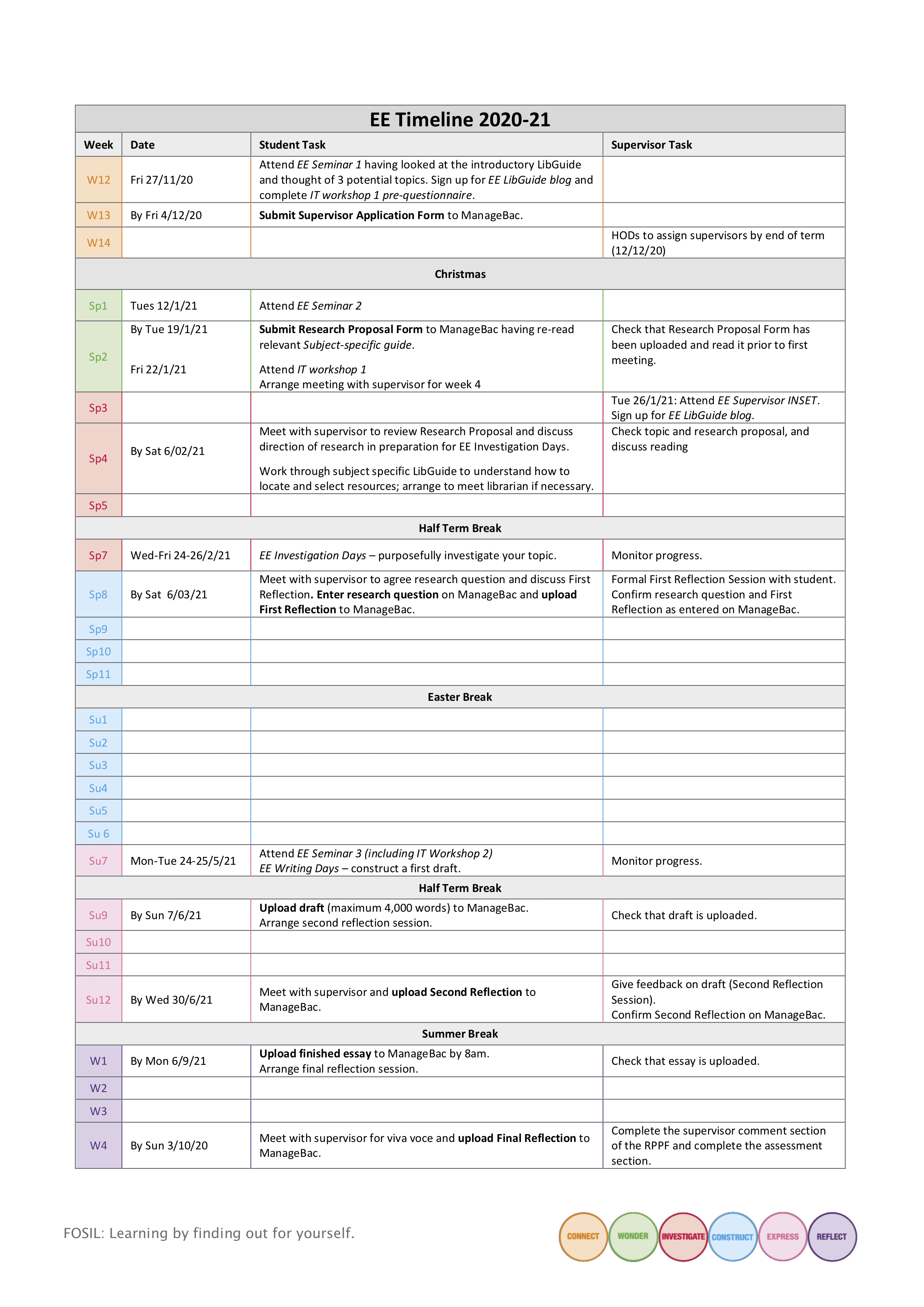
And this is our attempt to explain how it links with both FOSIL and Kuhlthau’s Information Search Process:
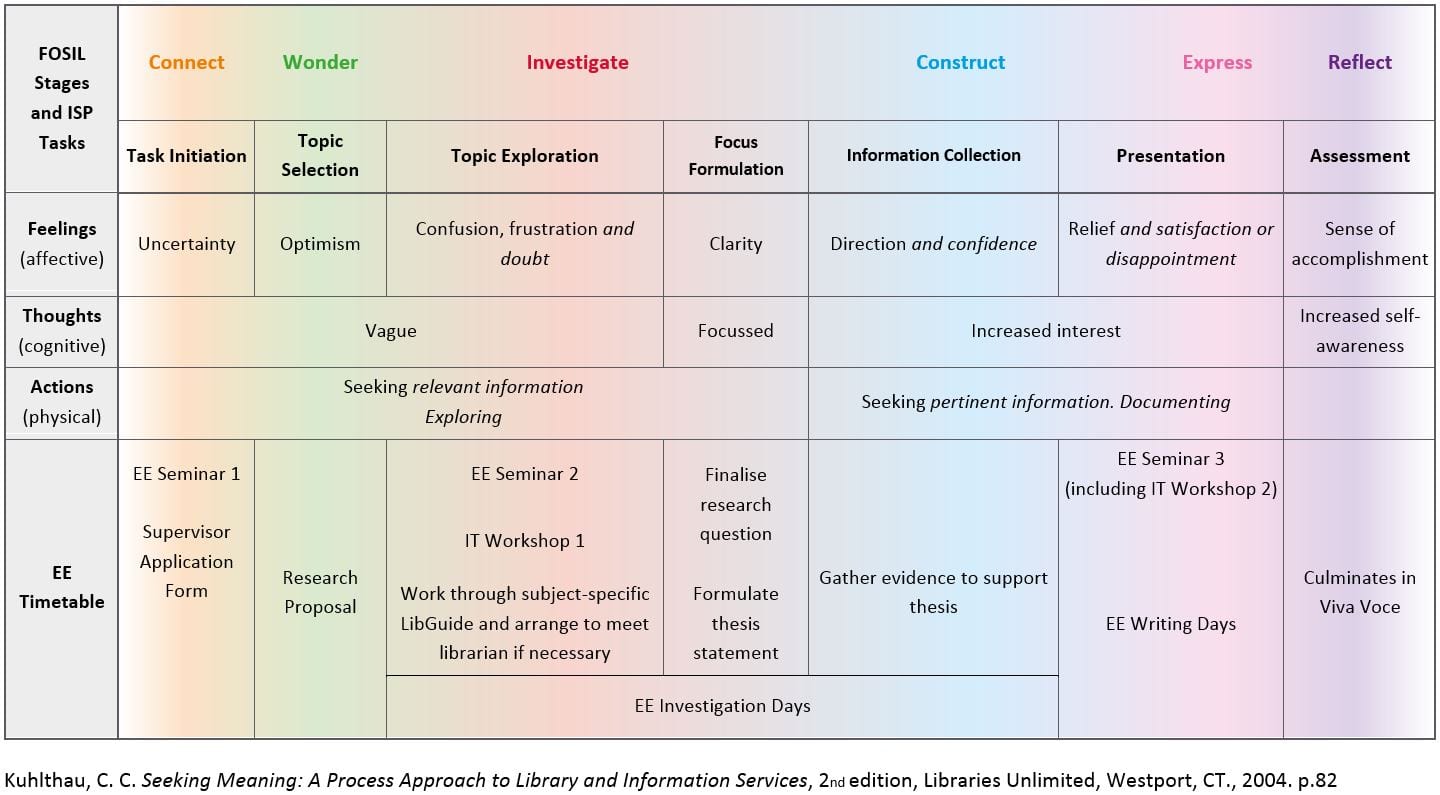
Although this may seem like quite a lot of support for just one component of the DP, the skills that students learn during this process are vital both for other subject based coursework they will complete during the two year course and for subsequent university studies. Many post-DP students who have been in touch with us have remarked how much better prepared they felt for university studies because of the skills they learnt during the EE. This is also, to an extent, our ‘space program’ (see “What’s your space program(me)?” in the Effecting change forum). Because it is such a long, in-depth inquiry with an entire cohort of students across all subjects, that is guaranteed to be repeated every year, many of the resources we create and insights we have can easily be repurposed in other areas and trickle down throughout the whole school, and across into A-level courses.
I am planning to outline below how our support has developed over the last two years since I became Upper School Curriculum Librarian, and what I have learnt in the process (I am less qualified to comment before that!).
3rd January 2021 at 6:17 am #33567Our excellent and experienced DP coordinator has recently stepped down and, as the school looks to replace him, I realised how complex the relationship between the DP coordinator, Head of Student Research, Upper School Curriculum Librarian and supervisors is as we support students in their extended essays, and that this will be unique to a particular school. I produced this Venn diagram to help to explain the current situation to candidates (or to the new DP coordinator once appointed) so that even if they do choose to make changes, they are doing so from a position of understanding what we currently do. I am curious how this compares to the arrangement in other IB DP schools and would love to hear from others about this. For us, the high degree of collaboration, in particular between the Head of Student Research and the Upper School Curriculum Librarian is very powerful, and I will make time to write about that elsewhere at some point!
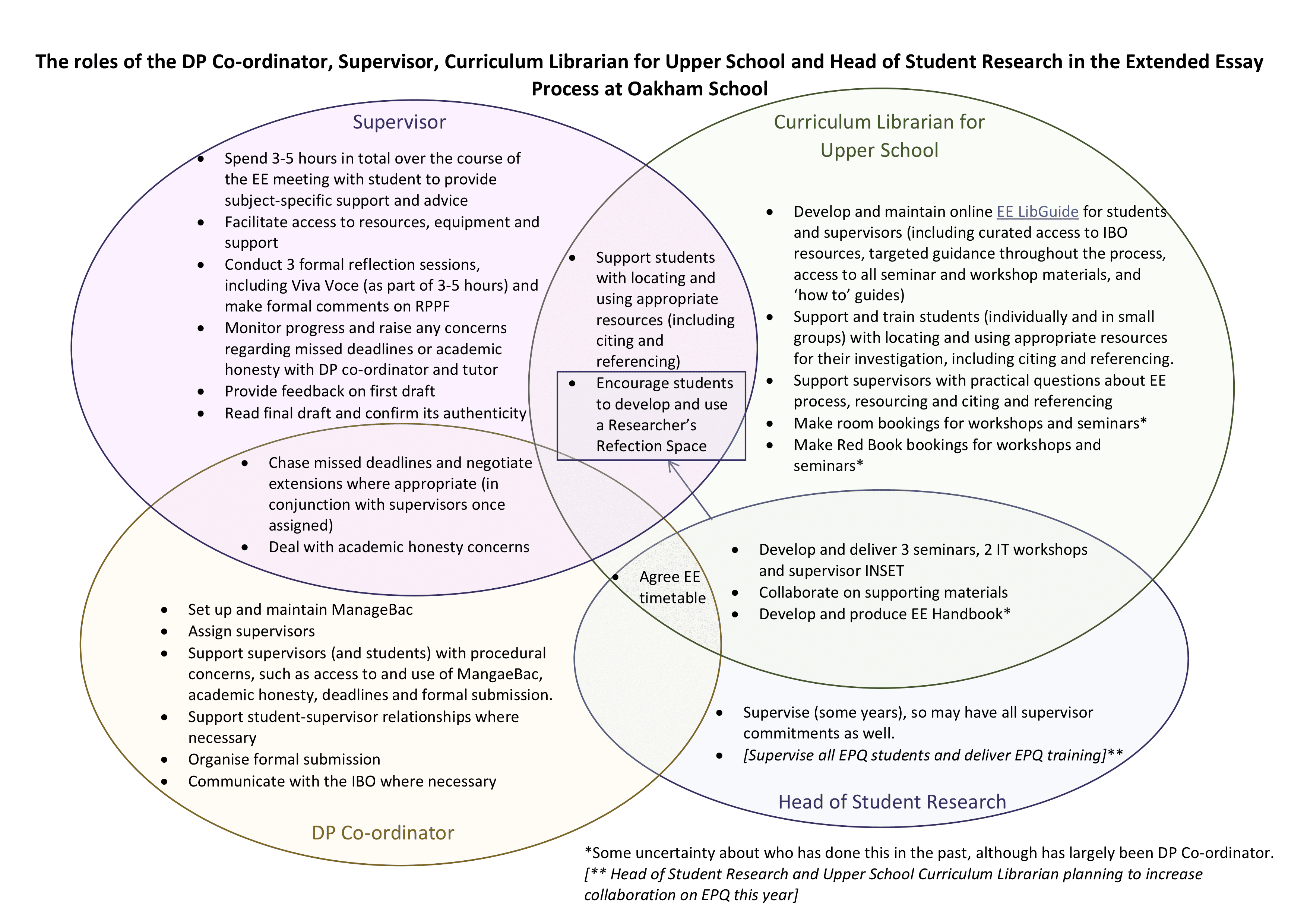
(Note that ideally, from an IB perspective, I would have included the role of the student too, but producing a four section Venn diagram in 3D stretched the format – I think a five section one might have broken it completely! Note also that these are not intended to be FOSIL colours.)
Attachments:
3rd March 2021 at 12:08 am #37354Development of our support for 2019-20
I took over as Curriculum Librarian for Upper School in January 2020, although as a Library Assistant with responsibility for developing FOSIL resources I had had a role in supporting the previous CLfUS and been involved in EE support for a little while. I had also had some involvement in the process in a previous Librarian role at Oakham a few years ago. The Library’s critical role in the EE at Oakham extends back well over ten years, since Darryl first started as Head of Library, and he was personally responsible for our support of the EE process until 2018. The support has evolved and improved throughout that time, with important changes in the structure and content of the seminars, and in the IT workshops, that Darryl would be much more qualified to talk about than I am. I am going to concentrate on the last year and a half.
One of our main goals was to improve our asynchronous provision and make support more easily available to both students and supervisors throughout the process, rather than relying on students to contact us if they needed help between scheduled intervention points. I also wanted to make the process more transparent to supervisors, so that they could see exactly what support we provided, and direct students to it as necessary. It is important to bear in mind that supervisors are only allowed to spend 4-6 hours with students during the whole process (which at our school takes almost a year) so students do need to have other sources of support for key skills.
Following some research into what other IB schools around the world were doing (and a comment by John Royce when he ran some excellent on-site training for us) we decided to invest in LibGuides in October 2019. If you haven’t come across this, it is a essentially a website building package specifically designed for libraries (they describe it as “web publishing and content curation“. In the UK education sector, my impression is that these are most commonly used by university libraries, but they are widely used by schools (and public libraries) around the world. In particular, many IB schools have developed excellent LibGuides to support the EE. Getting an EE LibGuide up and running from scratch during my first year supporting the EE process was a challenge (and I owe a debt of gratitude to Susan Trower for the comprehensive guide she has put together for West Sound Academy, WA which helped me to think through the structure).
In my first attempt I decided to split the guide in two linked guides, with a General Extended Essay Guide that was suitable for all subjects:
and individual Subject Guides (e.g. this one for English) which could be used to provide subject specific guidance for both the EE and IAs (subject-based coursework):
Note that these links are to archived versions of last years’ guides, which are not in use any more! I learnt some important lessons about guide design, which I will share in the next post…
In general, the resource did exactly what I had hoped. It was a structured online guide to the whole process with downloadable resources and links that students could access whenever they wanted from anywhere in the world. We could also embed widgets such as videos and quizzes (we used Microsoft Stream and Forms to host/create these).
In retrospect we were very, very lucky because the resource was up and running and students had been introduced to it in December 2019, and worked with it during our usual targeted interventions in January and early March. So when the global COVID pandemic and school shutdowns hit in March we already had all our support available online. It was then relatively easy to shift Seminar 3 and IT workshop 1 (in late May 2020, during the first UK lockdown) into online video format with accompanying quizzes and email support (and individual Teams meetings where necessary) during the Writing Days. It would have been much harder to shift to online support so quickly if this resource hadn’t already been in place.
While this was a huge step forward in our EE support, it was very much a first attempt and as we worked through the year I could see all the structural mistakes I had made and things I wished I had set up differently in the first place. I couldn’t change it during that cycle because it would confuse the students – but I gritted my teeth, archived the first version over the summer and started all over again for October 2020 because I knew it would be better the second time! I’ll explain what needed to change in the post below.
3rd March 2021 at 1:53 am #37369Changes for 2020-21
In principle splitting the guide in two (see above) was a good idea. One thing I found challenging about many of the EE LibGuides I found online was how many tabs they had (including nested tabs), and how complicated they made the whole process look right from the outset. By splitting the guide I reduced the number of tabs and left open the opportunity to provide much more nuanced subject-specific guidance (which could broaden out into coursework support).
In practice it turned out to be a sledge-hammer-to-crack-a-nut approach and created these problems:
- I ended up with 26 individual guides to deal with. While the platform allows you to mirror pages between guides (so that if you edit one copy it changes in all of them), making it possible to curate this number of guides, I only realised once I got going that this should be used sparingly because it makes it very difficult to use hyperlinks to navigate the guide. On a mirrored page you can’t hyperlink to another place the same subject guide because the link in the template for the mirror will only point to a single page e.g. in the English guide, which is no use at all for the 25 other subjects.
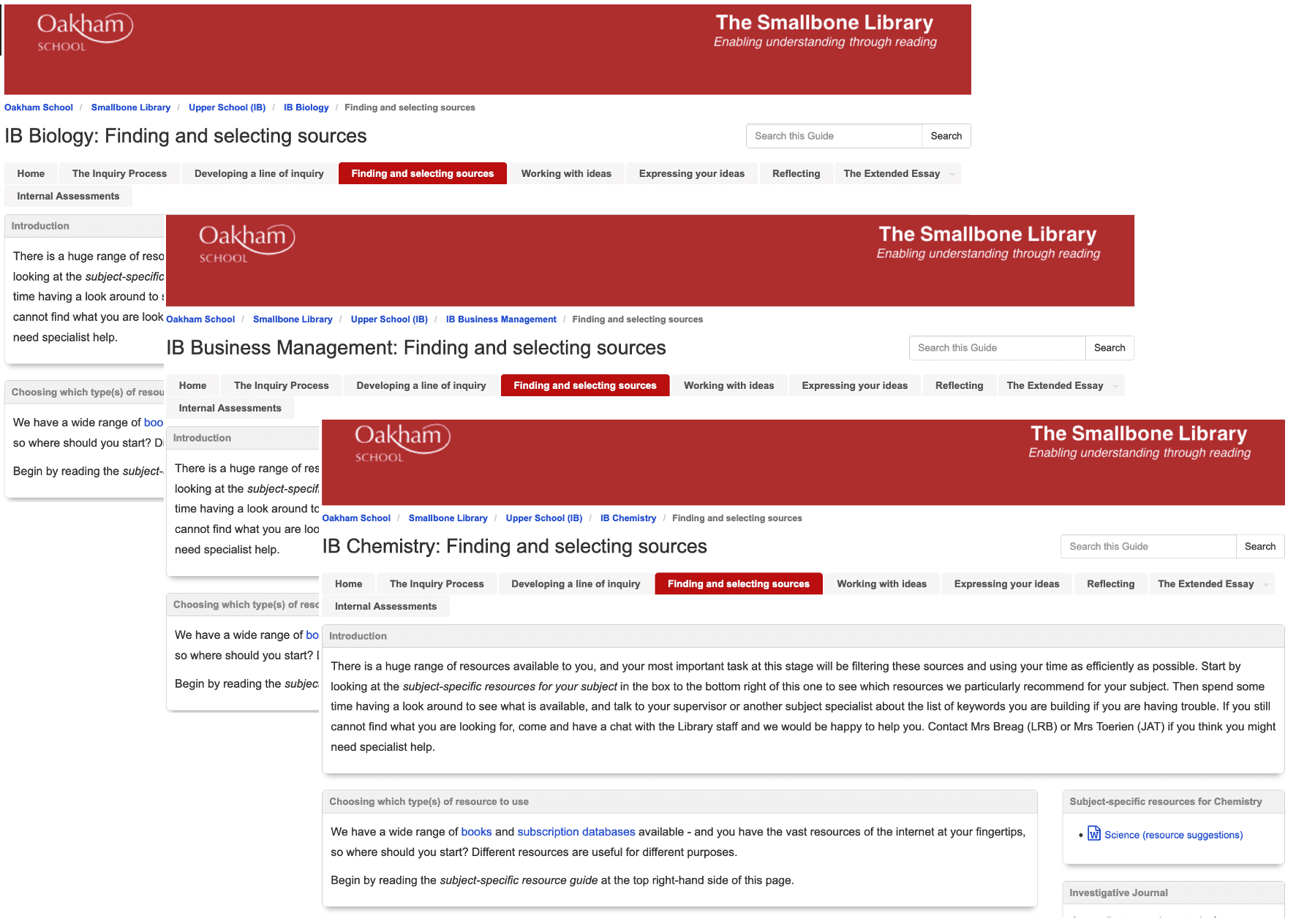
- It was confusing for students trying to remember what was in which guide. I had mirrored a number of pages between the General Guide and the Subject Guides to help them to find what they needed whichever guide they were in, but this possibly made it more confusing that some pages were in both guides but some only in one.
- Splitting the process between two guides masked the FOSIL structure of the process, because (for good reasons at the time!) Connect was only in the General Guide, Investigate, Construct and Reflect were only in the Subject Guides, and Wonder and Express were in both. [I didn’t originally intend Express to be in the General Guide. This happened as a consequence of the virtual nature of the Writing Days. They were supposed to move from the General to the Subject guide during Wonder and not move back!]
In my redesign I wanted to:
- Simplify the structure
- Make the hyperlinking (a real strength of the format) work again
- Highlight FOSIL and make the FOSIL structure much clearer, helping students to navigate the process better
This is what I came up with: 2020-21 Extended Essay LibGuide
I think it is better because:
- It is a single guide for the whole process (sort of… more later!).
- Now I can use hyperlinking really effectively as a guide navigation tool, for example I have put contents boxes at the top of pages with a lot of content to help students to navigate them more easily (see below).
- I learnt some CSS over the summer, which enabled me to some colour tabs and boxes in FOSIL colours (it isn’t perfect and I’ve ended up with some unintended colour bands in the Seminars and Workshops drop down menu that I need to try and fix at some point. If anyone has experience with CSS and can help me work out where I went wrong, I’d love to hear from you!). I am really pleased with this. It isn’t just cosmetic – for students familiar with the FOSIL colours I think it makes the guide much easier to navigate and less daunting at the start.

- We have significantly expanded our support for reflection. I have a better grasp of what the IB mean by a Researcher’s Reflection Space and am being much more purposeful about encouraging students to use one.
I did cheat a bit in saying everything is in a single guide. Although this guide does cover the whole EE process, it is supported by two (linked) supplementary guides – Recommended Resources – Upper School and Citing and Referencing (APA). The idea is that these are guides that are available for use throughout the Upper School (they are not EE or even IB specific) that give specialist support in two key areas – locating suitabke resources and citing and referencing them. There is no chance of them being confused with the EE Guide because they look very different, and they are already proving very useful across the Upper School more generally (we run A-Level and BTEC courses as well as the IBDP).

The final thing I am using more purposefully this year is the EE blog. All students and supervisors are asked to sign up (there is a separate blog for each cohort), and I can use this as a ‘tour guide’ to the site and the process, highlighting where students should be in the process at a particular time and which bits of the LibGuide site will be most helpful to them at this point.


I also have feedback I want to give about how we have changed our support for the IT workshops this year – partly forced as a result of the pandemic, but it has worked so well that I think we will make permanent changes – but that will have to wait for another day!
We’d love to hear about anyone else’s EE (Or EPQ) journey here too. How has your provision changed over time? What lessons can you share? How has the pandemic affected what you do, and do you think you will make any permanent changes as a result?
3rd March 2021 at 2:59 pm #37406Thanks Jenny, for sharing that. 2 points occur to me.
- I have come across Susan Trower’s Lib guides and found them helpful. I have been using MS OneNote to create a similar guide and wondered if anyone else had used this as a free alternative to LibGuides. Can anyone explain the advantage of LibGuides to me?
- I think this is also getting to the nub of my current difficulty with teaching and Inquiry. I need to teach our Year 12 students how to reference as they have never been taught this as a skill – either as an integrated skill in an Inquiry process or as a skill on it’s own. I am working on embedding this, amongst other skills, from year 7 so in time this will become less of a problem. However, we also have an intake of students from other schools at Year 12 and so we will always need to offer this skill as a top up.
My question really is when it is necessary to teach a specific part of the process should I be aiming to embed this into a broader piece of work or just accept that this is not the time – that their EE is that broader piece of work – and just teach them why and how to reference?
Ruth
3rd March 2021 at 3:46 pm #37409Hi Ruth. Those are both really important questions and deserve thoughtful answers. There is so much I immediately want to share, but I’m going to need to be good and focus on what I’m actually supposed to be working on today :-). I’ll definitely get back to you over the weekend though.
4th March 2021 at 2:20 pm #37473We decided not to fork out for LibGuides although I’ve seen many good examples of them for the EE. I designed my own set for the process for our intranet Firefly, but I’m also now using OneNote ClassBook for the pupils as a reflection space and a place for them to think about ideas and topics. I always take the EE as a separate entity when it comes to referencing, even though the pupils are learning to reference lower down the school. This is because the IB has specific instructions on what needs to be included in a reference, and also I teach the pupils at least 2 styles of referencing whereas elsewhere they are only taught Harvard. I find a 30-40 minute referencing session with EE pupils around this time at their Study Day is sufficient, and then I offer refresher sessions once they have done their writing.
7th March 2021 at 10:23 pm #37716Ruth and Emily both raised two important questions and I’m going to answer them in two separate posts. Partly for clarity, but also partly because if this topic continues in both directions I might need to split it into two separate topics (so it would be helpful if in any replies you could address these issues separately). I’ll answer the LibGuides one today and the referencing one a bit later in the week when I get a gap.
7th March 2021 at 10:26 pm #37717LibGuides: Summary
It was a big decision for us to choose to subscribe to LibGuides because it is expensive, and did require cuts elsewhere in our budget to find the money (I don’t think anyone is in a position to make budget increases right now!). I’m going to explain why we think it was worth it and will definitely be continuing with our subscription, with the following caveats:
- When we were investigating LibGuides I found it quite difficult to find detailed, unbiased reviews of what the platform could do, what it couldn’t do and whether people thought it was worth the cost, so that is what I will attempt to provide here – along with a helpful record for me in case I need it to justify the cost in our budget this year 😊. I have no affiliation to or connection with LibGuides/Springshare. I am not ‘promoting’ the product and neither I nor the FOSIL Group get any benefits from this post. It is just my opinion.
- As a school we do not have a Learning Management System (LMS) or Virtual Learning Environment (VLE) that I can tap into. I have no experience of a platform like Firefly and, given you have chosen to use this Emily, it is highly likely that we could have achieved something similar if we had had access to that. I would love to hear more about what you do (I’ll make a post over the next few days about how to add images to your posts in case you have time to share something of what you do with the community and want to put some images in). We do have Moodle, but it is not widely used within the school and when I had a play with it, it did not do everything I wanted and I was aware that, because it wasn’t really used, I would have to train pupils to use it in a way that I didn’t feel was necessary with LibGuides because they are more intuitive.
- This was our solution to the asynchronous EE support problem. It is not the only solution and different schools have very different circumstances. Just because it was right for us, I am certainly not suggesting that everyone needs to do it this way. While there are reasons that I decided not to use OneNote (which I will explain below), I am certainly not criticizing anyone who does feel able to provide their support in that format.
Summary (TL/DR!)*
Pros:
- Very visually attractive and easy to navigate and edit
- Very stable
- Easy to reuse resources between guides, in either a mirrored or copied format
- Blog feature
- Easy to lock down my content…
- …but everyone can see it
- Student and supervisor resources are in the same place
- Can bring all library resources together into the same place. Great for making a Library website. Massively customisable if you want to.
Cons
- Cost!
- No SSO for databases. With LibGuides CMS you can password protect areas or use “CAS and SAML/Shibboleth/ADFS”. I haven’t really explored this because the only page I want to protect is the A-Z Databases page and, as far as I can tell from conversations with their support team, this isn’t possible.
- It is ‘one way’. Students can’t contribute.
*TL/DR = Too long, didn’t read!
7th March 2021 at 10:46 pm #37718LibGuides: Detailed review
Pros
1. Visually attractive, easy to navigate and edit
It is easy to dismiss this aspect, but we’ve all had those books we know are great but that just won’t circulate until you get a version with a new cover…. LibGuides look like a website and work like a website. Students find them easy to navigate and use, and the back end is very easy to edit. If you want to do fancy things (like recolouring boxes and tabs) you need to learn a bit of CSS but everything else – from adding text and images, to uploading documents and embedding videos and forms – is very straightforward. If you are interested, a free trial when you have a bit of time to play is definitely worth it – and they were quite generous about extending ours when we were unexpectedly busy and couldn’t explore everything we wanted to in the time we had.
It may also seem like a small thing, but I also think the fact that every page of every guide has our custom banner at the top really matters on an advocacy level. Even for inquiries where we have provided resources but have no role in delivery, the Library’s involvement is clear – and we can sneak our mission statement of “Enabling understanding through reading” on there too.

2. Very stable
I’ve never had a problem with LibGuides going down. By contrast (and admittedly this was a couple of years ago) when I’ve used OneNote in whole class inquiry situations there is often one student who can’t access the class notebook for some unknown reason and I need to remove and readd then to the guide on the spot. This is OK for class teachers who see their classes a few times a week, but when I only see the EE students as a group four times a year I need my chosen platform to just work without any glitches. We also use OneNote extensively as a tool for collaborating between the Library staff and, while it is generally brilliant and I wouldn’t want to be without it, there are times when the synching is quite glitchy. With LibGuides I am confident that if I have posted something it is definitely there and the students will be able to see it.
3. Reusing resources between (and within) guides
This one is huge for me, and one of the reasons I really like the platform. When you want to reuse a resource (such as a content box, an entire tab, a document, a ‘widget’ (e.g. a video or a Form) you can choose whether to copy it, in which case you can make changes that won’t affect the original, or mirror it, in which case it will always look the same as the original version. This is great because then if you update the original the change cascades through all the linked guides automatically. My understanding of OneNote (and I could be wrong, so please do correct me) is that your only option is to copy a page to another notebook, and once copied it has no link to the original. You could also create a hyperlink I suppose, but that would rely on being certain that the users had access to both guides. Now this isn’t an issue if you only ever intend to have one EE notebook, but we have found LibGuides so useful that we now have many different guides at different levels of the school and the mirroring feature is great for keeping them up to date.
4. Blog feature
The blog has been brilliant for communicating with the EE students. Yes, I could email them, but the blog emails them to notify them of a new post and then keeps all the communication in the same place so they can look through it at any time. It doesn’t get lost in their email accounts. Like many things in LibGuides, it’s similar to something else that I could do another way, but better. The judgement to make is how much all of those things taken together are worth to your library.
5. Easy to lock down
This may sound a little control freaky of me, but something I really like about LibGuides is that they are only editable by Library staff (or other staff you choose to give an account to – and there are levels of account where you can give particular people the ability to edit some guides and not others, or to need their edits checked by an admin level user before they go live).
In a OneNote class notebook you would be able to decide who has access to edit the content library in terms of who was added as a ‘teacher’ – but in order for supervisors to be able to see the individual student tabs you would need to add them as teachers. Which is fine, but I wouldn’t be entirely comfortable with all the supervisors being able to edit my content and potentially accidentally alter stuff. But it wouldn’t make sense not to allow supervisors to view their own students’ pages. I’m not sure what choice I’d make here if I used OneNote, so I am curious what you have chosen to do.
6. …but everyone can see it
I don’t need to ‘add’ anyone to my guide. Everyone can see it as soon as I publish it – EE students, supervisors, subject teachers and HODs who aren’t supervisors this year, SLT, parents, GCSE students who are curious about the EE, people external to the school… I really like this transparency and it seriously reduces my admin time because I don’t have to worry about giving the right people access. For example, during lockdown we had a parent who was concerned about whether his child was being given appropriate support for the EE and I could send him all the links that his son had access to (which also explained the ‘live’ support on offer). He was instantly much happier and more reassured, and on board with encouraging his son to use the support on offer. I can also have Year 12 IB and Year 13 IB using the same guide at the same time. Although Year 13 are supposed to have finished by the time Year 12 start, there are always one or two who have not for various reasons. Some Year 13 also return to the EE guide for support with IAs because they know where to find the materials. This means that Year 13 benefit from any updates I make for the next year’s Year 12. I wouldn’t want to do this with OneNote because of the massive proliferation of student tabs it would produce. I would need a new notebook every year (presumably copied from the old one).
Where there are downloadable resources that must be restricted to Oakham School users (or to certain groups within the school), perhaps for copyright reasons, I provide those as SharePoint links which allows me to set permissions for individual documents without affecting the visibility of the whole guide.
7. Student and supervisor resources in the same place
The ability to mirror boxes means I can put a supervisor tab on the student guide, with all the resources that are most relevant to the supervisors mirrored in one place. It means students and supervisors are going to the same place for their resources. Because we decided to go for LibGuides CMS (which has other benefits that I won’t go into here but would be happy to chat to anyone about), I could also password protect this tab if I felt strongly about it, but I generally haven’t because I have no problem with students accessing staff resources should they wish to. You could, of course, do this in OneNote with a supervisor tab in the content library (but no option to password protect) or a ‘teacher only’ tab if you had chosen to make the supervisors teachers on your guide, and put hyperlinks to the original resources. This one is not a game-changer for me, but I like the way it works in LibGuides.
8. All Library resources in the same place
This is (linked to point 3) absolutely huge. Having originally subscribed to LibGuides largely with the EE in mind, but hoping to use it for other things, we were actually astonished how rapidly our use expanded across almost all areas of support that we offer. Within a year almost every inquiry we support, along with all our reading schemes, has an accompanying LibGuide, and I learnt enough CSS over the summer to build a custom Library homepage on LibGuides that doesn’t immediate look like a LibGuide (if you ignore the big yellow COVID announcement box at the top of the page, which wouldn’t normally be there!). Heritage, our Library Management System is great, and we love the ability to endlessly customize reports, but the customization options on the homepage are a bit limited and fiddly to use. With LibGuides and a bit of coding background it is easy to produce an attractive customized homepage giving access to all your resources (including a bunch of libguides!) in one place. We have had amazing feedback from our classroom colleagues about how useful the guides are – and the open access makes it really easy to show one colleague a guide that has been produced for another subject so they can see what we can do. On an advocacy level it is incredibly valuable to us that all our content is immediately visible to everyone from our homepage so they can instantly see how much we are involved with, and the impact of this within your school should not be underestimated.
Cons
Nothing is perfect, and there are, of course, downsides to the platform:
1. Cost
A LibGuides subscription is expensive, and would require sacrifices from a budget – or making a case for a budget increase, which is pretty challenging for us all right now. We felt really lucky though that we had made the decision to get it in October 2019, and had it up and running before all the lockdown chaos began, and we definitely wouldn’t be without it now. It enabled us, for example, to get involved with planning and producing resources for one of the Academic Cornerstone Courses that was delivered to Years 11 and 13 during lockdown last April, which I do not think we would have been invited into without it. It has definitely been worth the cost for us. However it will not be possible in every school on every budget.
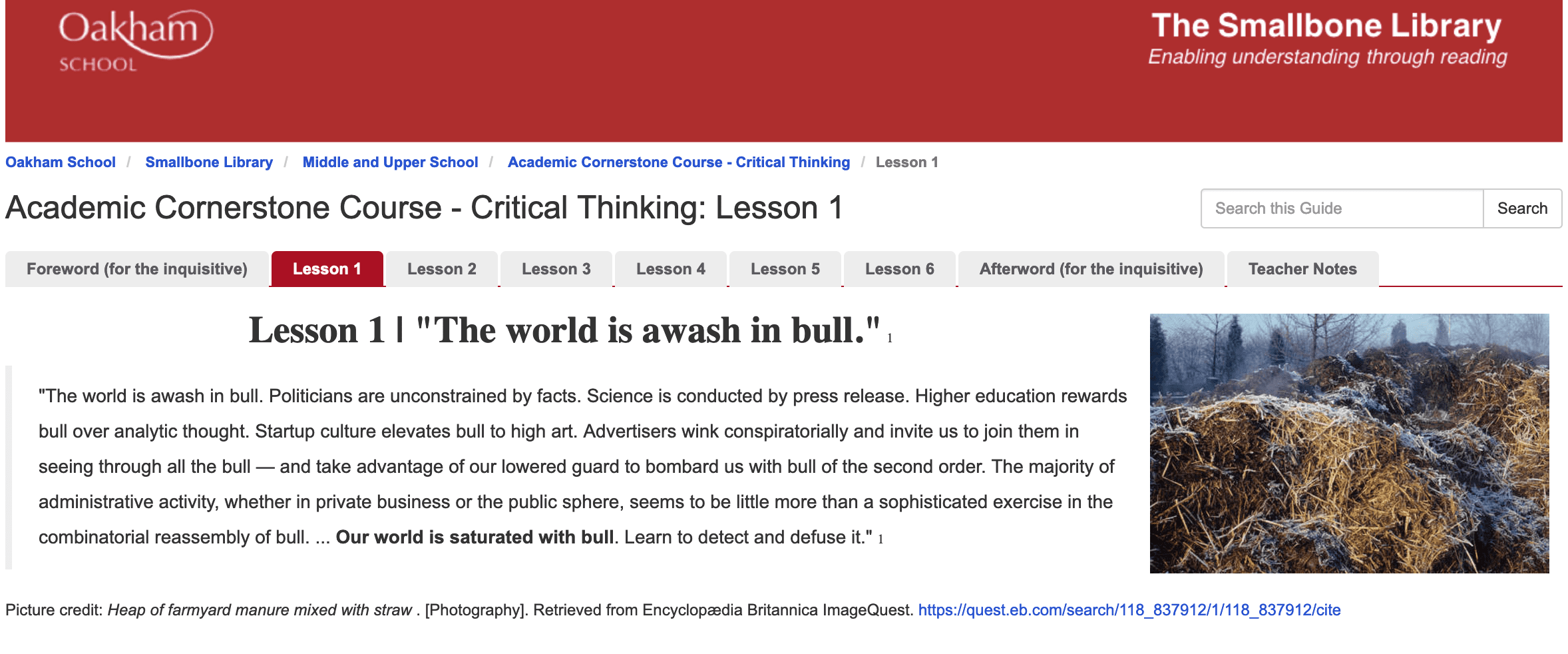
2. Authentication
This one is a bit of a niggle, which may seem perverse given all I have said about the advantages of an open access resource. In LibGuides CMS there are all sorts of access permission options (which may include single sign on, I haven’t fully explored them yet) for the guides, but NOT for the A-Z databases page (I have checked this with Springshare support). This is a real problem for us because, like many schools, we don’t have anything like the university style Shibboleth or Open Athens, our databases are either accessed by ‘private’ direct links or by passwords. Neither of which can be posted on a public webpage. My only option has been for the database links to point to a Library Sharepoint site which contains all the ‘real’ links and passwords. This is a clunky solution that I am not really happy with and I wish they would come up with a better one! Initially I didn’t use the A-Z databases feature at all, but it does have some advantages so I am giving it a go with this clunky work-around.
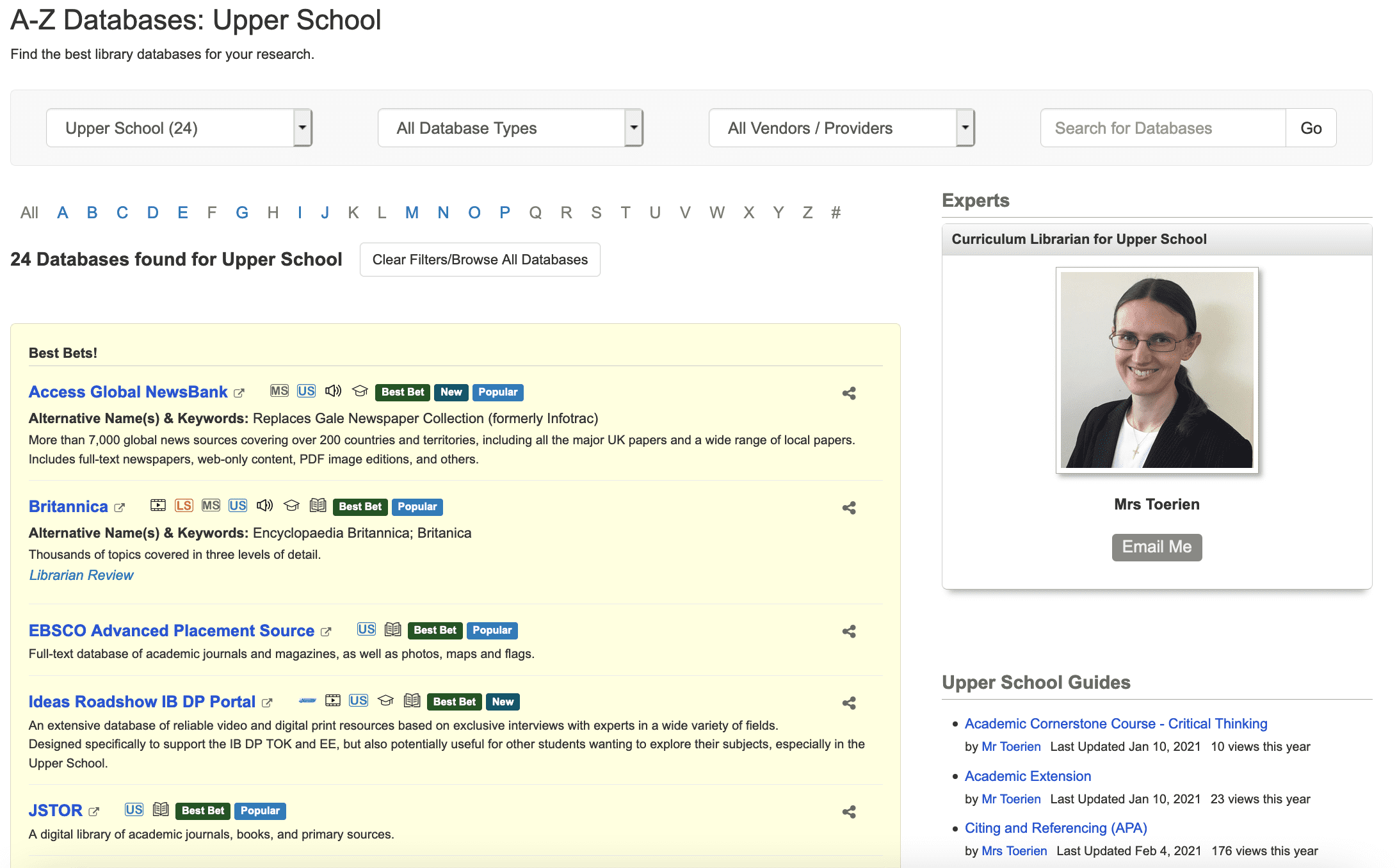
3. Students can’t add content
Again, a reflection of the advantage above that everyone can view and no-one but library staff can edit. If I wanted to create a load of ‘user’ accounts (which I don’t – too much admin, and I don’t want to make things complicated by giving staff and students more usernames and passwords to remember) there is some functionality I could use, like allowing people to comment on blog posts, but it isn’t worth it. What I tend to do instead is use Teams (and potentially OneNote) and put links to the Team in the LibGuide. We had great success in getting students to do an assignment in Teams following the IT Workshop (which I will discuss in another post) and this was absolutely the right format for that. I could see at a glance who had and hadn’t submitted, mark the assignments and give feedback within the Team. And all the supervisors can see the feeback and the mark should they wish to.
I also encourage students to set up their own OneNote notebooks as their Researcher’s Reflection Space and to share them with their supervisors. I don’t insist on this, however. Some students still prefer to make notes on paper, and some would rather just use a folder on their computer/OneDrive. That is between them and their supervisors to decide. I don’t particularly like the RRS in Managebac – it’s too linear – but I do tell them it is there if they want to use it.
This isn’t really a con for me, to be honest, as I am very happy with LibGuides as a one-way content delivery platform (there are other ‘LibWizard’ add-ons such as forms and forms and quizzes if you realy want them and can justify the cost, but we haven’t subscribed to that). I have access to plenty of other options for two-way communication.
__________________________
Hope that helps explain our decision to use LibGuides. I’d love to hear other’s reviews of the platforms they have chosen. Nothing is perfect, after all, so I am sure we can learn as much from your choices as you can from ours.
- 3 seminars for the whole cohort at critical intervention points
-
AuthorPosts
- You must be logged in to reply to this topic.
